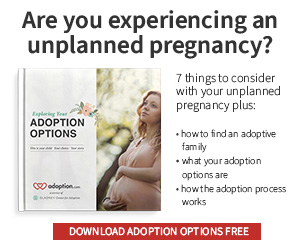ADOPTION IN
Tennessee

Adoption in Tennessee is the legal transfer of parental rights from the biological parent(s) to the adoptive parent(s). If you are considering placing a child for adoption or adopting a child, the Tennessee process can be overwhelming at first, but the Adoption.com team is prepared to support you and answer your questions.
Adoption Near Me

Considering Placing Your Baby or Child for Adoption in Tennessee? You can learn more here or call an adoption counselor 1-800-236-7898.
Domestic Infant Adoptions can be completed through a Tennessee adoption agency or adoption attorney. Click here for a directory of adoption service providers in Tennessee.
International Adoptions must be completed through an adoption agency or adoption attorney. Find an international adoption service provider here.
Foster Care Adoptions in Tennessee can be completed through the Department of Children’s Services (615-741-9701). Gallery of children waiting to be adopted.
Join the Tennessee adoption group in our community!
Looking for more resources in your area? Check out the Adoption Directory for a listing of adoption professionals in your state.
I’m considering placing my baby or child for adoption.
Pregnant and have questions? We can help answer your questions by telling us what works best for you.
Are you pregnant and considering adoption? Do you need help getting started?
Click here and help us understand what your needs are and the preferences you have. We can help you get started.
Adoption in Tennessee
By: Sarah Beth Britton
Home of Memphis, Nashville, and the Great Smoky Mountains, Tennessee is a landlocked state in the south of the United States. Tennessee is a beautiful place to live and work, and each year hundreds of children are adopted in this state. If you are facing an unplanned pregnancy in the state of Tennessee, your mind is likely swimming with a sea of emotions and questions. Take a deep breath and know you are not alone. This guide is designed to walk you through your options and to provide some further information about adoption in TN.
It is important to remember throughout this journey that there is no right decision. Depending on your circumstances, you may have family and friends in your ear offering up their advice. Take a deep breath. The choices you need to make about your unplanned pregnancy are no one’s decisions but your own. You have three options when it comes to an unplanned pregnancy: choosing to parent, choosing to terminate the pregnancy, or choosing to make an adoption plan. It might be that now is not the right time for you to have a child. You may lack financial stability, want to finish schooling, or not be at a place in your life where you are ready to parent a child—and that is okay. If you are exploring placing your child for adoption, this article will guide you through some steps of adoption in TN.
Adoption is the legal termination of the birth parents’ parental rights and the legal granting of those parental rights to either a child-placing agency or the adoptive parents. Adoption does not occur because you do not love your child. In truth, adoption can be one of the most loving choices you can make both for yourself and your child. You may choose to place your child for adoption at any time during your pregnancy—and you can change your mind and decide to parent your child at any time during your pregnancy. In fact, most states, including TN, do not permit birth parents to terminate their parental rights until a few days after the baby has been born.
When considering adoption, you will need to determine if you want to work with an adoption agency or an adoption attorney. Meeting with an adoption agency or an adoption attorney does not mean you have to place your baby for adoption. It means you are doing your research so you can make an educated decision of what is best for you and your child. You may choose to meet with an adoption agency counselor or an adoption attorney anywhere you are most comfortable, whether it is in their office, a nearby coffee spot, or in your own home. If after your meeting you decide to parent your child, then a good adoption agency or adoption attorney will provide you resources and guides for your next steps. If after the meeting you decide to place your child for adoption, then both an adoption attorney and an adoption agency will walk you through the steps of adoption in TN and can help you understand your rights as a prospective birth parent.
You have the choice whether you want to work with an adoption agency or with an adoption attorney. Working with an adoption attorney is sometimes called an independent adoption, though, in the state of Tennessee, it is illegal to use an adoption facilitator. There are pros and cons to working with an agency versus an adoption attorney. Some expectant parents and prospective adoptive parents feel that working with an adoption attorney can lead to the development of a closer relationship between members of the adoption triad. That said, with an adoption attorney, there may be more work to find prospective adoptive parents if you don’t have someone already identified.
One of the benefits of an adoption agency is that you will have access to a database of prospective adoptive families, counselors, adoption attorneys, and birth parents. Finding a support system is crucial during this journey, and connecting with others who have walked this path can be very helpful. When meeting with a potential adoption agency or adoption attorney, ask any questions you may have. What kind of pre and postnatal support will they give you? What resources are available to you? How much experience do they have with expectant parents? Do they work only in Tennessee or in other states in the country as well?
Both an adoption attorney and an adoption agency can also help you determine how and when to share the news of your pregnancy with the father of your child—if you have not done so already. Sharing the news can be a difficult conversation to have, and first and foremost, you should make sure you feel you are in a safe situation to have that conversation. If you do not, consult with your adoption attorney or your adoption agency or speak with your counselor. In some cases, the agency or attorney may be able to have the conversation on your behalf, particularly if you feel the news would place you in an unsafe circumstance. If the father of your child is unknown, the agency or attorney will consult the Tennessee putative father registry. If the father has registered, he will be identified and notified of your intentions to place the child for adoption. The father has 30 days from receipt of the notice to come forward. If he does not, then the court shall view his lack of response as sufficient cause to terminate his parental rights.
Whether you work with an adoption attorney or an adoption agency, you will not incur any expenses as the expectant parent. Adoption costs you nothing. The law of adoption in TN permits the payment of pre and postnatal medical expenses, birth-related expenses, counseling fees (both prenatally and postnatally for up to a year), transportation expenses related to the pre and postnatal visits to your doctor, lawyer, and counselor, as well as any legal fees procured. Reasonable living expenses such as maternity clothes, food, and housing are also permitted 90 days before the birth of the child and up to 45 days after the birth of the child. All money must go through the adoption agency or adoption attorney and may not be paid by the prospective adoptive parents to the expectant parents directly. Additionally, all expenses reimbursed must be submitted to the court and reviewed before the adoption may be finalized.
After identifying an adoption agency or an adoption attorney, your next step may be to choose a prospective adoptive family for your child. Aside from the decision to place your child for adoption, this is a big decision that only you can make. Take some time to consider what kind of life you would like your child to have. Do you envision your child living in a rural area, a big city, or someplace in between? Are there any skill sets or interests—like music, the arts, or sports—that your child’s prospective adoptive family needs to have? What about race or ethnicity? What about religion? Know that every prospective adoptive parent with a completed home study has been thoroughly vetted and received background clearances and fingerprinting. Part of the home study process is for the prospective adoptive parent(s) to identify why they want to adopt and their hopes for their future child. Prospective adoptive parents then use this to create adoption profiles that you can look through. Adoption profiles can be a series of photos, writings, or even videos, all designed to showcase what life with them would be like for the adoptive child.
Another thing to consider when choosing a prospective adoptive parent is what kind of relationship you are open to having after the birth of your child. There are essentially three kinds of contact available: open, semi-open, and closed. In an open adoption, all members of the adoption triad are in regular contact. Phone calls, video calls, letters, and even in-person get-togethers might take place. Semi-open adoptions are similar to open adoptions, but in semi-open adoptions, in-person meetings rarely occur. It is often thought that semi-open and open adoptions are most beneficial to all members of the adoption triad, but you should use the level of contact that feels right to you. In a closed adoption, the communication between the members of the triad is just that, closed. No contact will take place until the child is 21 years old, at which time the birth parents or the adoptee may decide to search for one another. It should be noted, however, that while in some states post-adoption contracts are legally enforceable, for adoption in TN, this is not the case. Even if the adoptive parents and the birth parents enter into a post-adoption contract, should that contract be presented in a court of law, it will be viewed as null and void. In the eyes of the Tennessee court, contact of any kind (either through letters, virtual, or in-person) is at the sole discretion of the adoptive parents. This discretion applies to contact with the birth parents, any birth siblings, or any other family members or friends of the birth parents who wish to remain in contact with the adopted child.
In the lead-up to your delivery, your adoption agency or adoption attorney will help you think through your hospital delivery plan. You will want to consider who from your support system you will want there with you, who you would like in the room when you deliver, and who you would like to hold the baby. Know there are no right answers and know that you can change your mind—even the day of. Delivering a baby is an emotional, physically exhaustive time, and you are entitled to make the decision that is best for you when the time comes.
After the baby is born, you will wait three calendar days before you can consent to the adoption. During this time the child may stay with you, the child-placing agency, or the prospective adoptive parents. During these three days, you still are the legal guardian of your child. Even if you are under the age of 18, in the eyes of the law, you are still allowed to decide on behalf of both yourself and your child with the same legal rights as if you were an adult. After the three calendar days have passed, you may consent to the adoption, sign the consent forms, and surrender your parental rights. After signing consent, you have ten calendar days to change your mind and revoke the adoption. After those ten days have passed, your decision becomes irrevocable, and the adoptive parents will be named the child’s legal guardians. At this time, you will be given a choice as to whether you give consent to any further contact. If you choose no, you are likely pursuing a closed adoption. In this instance, unlike the post-adoption contract, the contact veto will be in effect, and you will be notified if anyone ever requests contact with you. It is up to you, at that time, whether you choose to have contact or not.
Life postpartum is difficult for any parent. Placing a child is hard. There may be days when you feel you made the best possible decision and days when you are unsure. You will grieve because you have experienced a profound loss. But you also made the best decision both for you and your baby. During this time it is important to remember that you are not alone. You are entitled to postnatal counseling for up to a year, and you should take advantage of that. Lean on your support network. Reach out to other birth mothers. Their words and experiences will provide more comfort than you can imagine. And know that adoption is a lifelong journey. No matter what level of post-adoption contact you chose, you are now a member of the adoption triad. And that is a remarkable thing.
Tennessee Adoption Guide
The information contained on this website is for educational purposes only and is not intended to be a substitute for professional legal advice. Always seek the advice of a licensed and qualified professional. While the content of this website is frequently updated, information changes rapidly and therefore, some information may be out of date, and/or contain inaccuracies, omissions, or typographical errors.
Can I Adopt in Tennessee?
Parents must be at least 21 years old to become a foster/adoptive parent. You can be single, married, or divorced. You can own or rent a home. You must be a legal resident of Tennessee. Applicants must complete a 23 hour PATH program to become certified. You must complete a home study.
What Adoption Regulations Exist in Tennessee?
Advertising: Only licensed adoption agencies, lawyers, social workers, and parents with approved home studies may advertise for placement of children. Only licensed adoption agencies, social workers, and the department may engage in the actual placement of a child for adoption. § 36-1-108(a)(2)
Relinquishment: Parents must wait until 3 days after the child’s birth before giving consent. Consenting parties may revoke consent within 10 calendar days after giving consent for any reason. After the 10 day period parents can revoke their consent up to 30 days after giving consent on the grounds that consent came under fraud or duress. The court can set aside consent up to the final adoption decree. § 36-1-112
Birth parent expenses: Payment for the following expenses is permitted: medical, hospital, counseling, legal, and living expenses. Living expenses cannot exceed 90 days before birth and 45 days after birth or surrender for adoption. § 36-1-109(a)(1)(B)
Post-adoption contact agreements: Contact agreements in Tennessee are not legally enforceable.
Birth father rights: Unmarried fathers wishing to receive notice of adoption proceedings may file their information with the Department of Children’s Services putative father registry. § 36-2-318
Finalization: The average time between TPR and adoption finalization in 2014 was 6 months.
Review Tennessee adoption laws in detail
Is Adoption Assistance Available in Tennessee?
Can I adopt a Child from another country?
It is always possible to adopt a child from another country, even if you live in the United States. Children under 18 adopted from a Hague Convention country entering the U.S. with an IH-3 visa may automatically receive U.S. citizenship.
Children adopted from a non convention country must qualify as orphans before receiving U.S. citizenship. When U.S. citizens finalize an adoption abroad, they must apply to the USCIS for an IR-3 visa for the child. An IR-3 visa classifies the child as an immigrant and may provide the child with citizenship upon arrival in the States.
Readoption after a foreign adoption is an option in TN, but not a requirement. Parents wishing to receive a State birth certificate for their child must submit documentation of either readoption or validation of a foreign adoption decree.
State Contacts
Gallery of children waiting to be adopted: https://adoption.com/photolisting?page=1&search_type=region&range=UnitedStates
State subsidy contact person:
Vicki L. Davis
Department of Children’s Services-Adoption Services
Cordell Hull Building, 8th Floor
436 Sixth Avenue North
Nashville, TN 37243-1290
Phone: 615-532-5634
Fax: 615-532-6495
Email: Vicki.Davis@state.tn.us
Summary
Adoptions in TN can be completed through the Department of Children’s Services.
Parents must be at least 21 years old to become a foster/adoptive parent. You can be single, married, or divorced. You can own or rent a home. You must be a legal resident of Tennessee. Applicants must complete a 23 hour PATH program to become certified. You must complete a home study.
Only licensed adoption agencies, lawyers, social workers, and parents with approved home studies may advertise for placement of children. Parents must wait until 3 days after the child’s birth to give consent. Parents can revoke consent in the court where consent was given up to 10 days after giving consent.
Payment for the following expenses is permitted: medical, hospital, counseling, legal, and living expenses. A putative father registry does exist, and contact agreements are not legally enforceable. The average time until finalization is 6 months.










